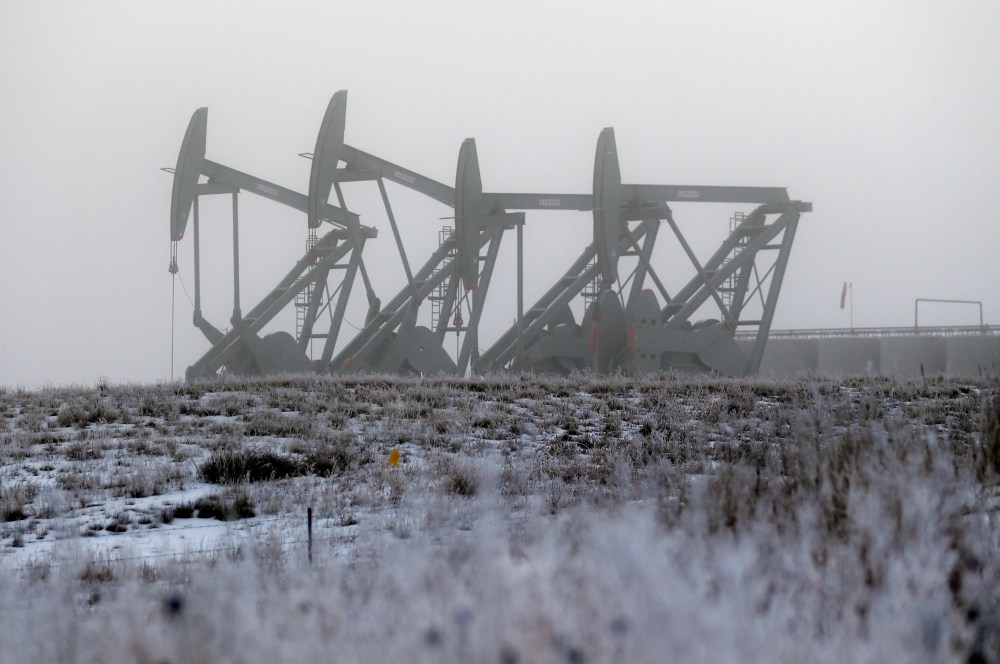First Nations sue over oil-rich land
Advertisement
Read this article for free:
or
Already have an account? Log in here »
To continue reading, please subscribe:
Monthly Digital Subscription
$0 for the first 4 weeks*
- Enjoy unlimited reading on winnipegfreepress.com
- Read the E-Edition, our digital replica newspaper
- Access News Break, our award-winning app
- Play interactive puzzles
*No charge for 4 weeks then price increases to the regular rate of $19.00 plus GST every four weeks. Offer available to new and qualified returning subscribers only. Cancel any time.
Monthly Digital Subscription
$4.75/week*
- Enjoy unlimited reading on winnipegfreepress.com
- Read the E-Edition, our digital replica newspaper
- Access News Break, our award-winning app
- Play interactive puzzles
*Billed as $19 plus GST every four weeks. Cancel any time.
To continue reading, please subscribe:
Add Free Press access to your Brandon Sun subscription for only an additional
$1 for the first 4 weeks*
*Your next subscription payment will increase by $1.00 and you will be charged $16.99 plus GST for four weeks. After four weeks, your payment will increase to $23.99 plus GST every four weeks.
Read unlimited articles for free today:
or
Already have an account? Log in here »
A pair of First Nations are suing the provincial and federal governments, claiming land and mineral rights to a swath of land in southwestern Manitoba that generates more than $1.3 billion annually from oil and gas production.
Canupawakpa Dakota First Nation and Dakota Tipi First Nation filed a statement of claim in Court of King’s Bench on Thursday calling for a declaration of title and subsurface rights over Manitoba’s portion of the Williston Basin.
The oil-rich basin stretches from southwestern Manitoba into southern Saskatchewan and over the U.S. border. The Manitoba portion hosts at least 14 identified oil fields and is home to all the current oil production in the province, the lawsuit states.

ERIC GAY / THE ASSOCIATED PRESS FILES
Oil pump jacks work in unison on a foggy morning in Williston, N.D. The oil field crosses the border into Manitoba and two First Nations are taking the province and feds to court over land and mineral rights claim in the southwest corner of the province.The plaintiffs are claiming rights over the entirety of the basin in Manitoba, including the “right to economically participate in the extraction, development and production of subsurface minerals.”
“The Dakota Nations are the direct descendants of the Oceti S’Akowin, who occupied the Williston Basin since time immemorial,” the lawsuit said.
“This property is being sold out from under the Dakota Nations’ feet, and the plaintiffs have never received any compensation or recognition as property rights holders thereto. Canada and the province have an obligation to compensate the plaintiffs for this.”
The lawsuit is the latest filed by Winnipeg lawyer Faron Trippier on behalf of Dakota Tipi First Nation, which has also claimed title over The Forks and several Manitoba Hydro operations, which it says reside on ancestral land.
It names Canada’s attorney general and the Manitoba government as defendants, claiming both have “breached their constitutional, fiduciary and other duties owed to the Dakota Nations” by granting subsurface rights to private landowners without the plaintiffs’ consent or consultation.
The lawsuit states that before Confederation in 1763, the Dakota had a positive relationship with the British Crown, defined by numerous treaties of peace, trade and friendship that were “reiterated, reaffirmed and expanded” in several treaties spanning 1767 to 1814.
“The treaties were intended to prevent war, foster allyship and facilitate trade with the Dakota. The treaties recognized and guaranteed the Dakota’s rights to… hunting, fishing, mining minerals, manufacturing products, trade, and to undisturbed use of their traditional lands,” the lawsuit says.
“However, the Dakota were deliberately and strategically excluded from the numbered treaties. The Dakota Nations’ Aboriginal rights, including title, have never been ceded and/or surrendered.”
The lawsuit states Canada managed all Crown land in Manitoba between 1872 and 1930. All land granted by the federal government until 1889 included the legal rights to everything beneath the surface of a property, including the right to resource extraction.
Canada began reserving subsurface rights after 1889, but most of the land in the basin had already been granted, leaving the Crown with only about 20 per cent of the remaining subsurface rights. The Dakota Nations want those rights transferred to them, or to be involved in economic participation or compensation, the lawsuit states.
The claim states the annual value of oil and gas produced in Manitoba through the Williston Basin is more than $1.3 billion. Manitoba generated $14.2 million on royalties from the Crown rights and $9.6 million in production taxes on private rights, it states.
The Dakota Nations are not seeking the transfer of rights held by private parties but want “equitable damages from Canada” proportional to what they would have received “had Canada not breached their duties by transferring away the private rights.”
The lawsuit states members of the First Nations have suffered ongoing hardship, loss of identity and generational trauma as a result of government actions. They are also seeking compensation for those damages.
The claim has not been tested in court.
tyler.searle@freepress.mb.ca

Tyler Searle is a multimedia producer who writes for the Free Press’s city desk. A graduate of Red River College Polytechnic’s creative communications program, he wrote for the Stonewall Teulon Tribune, Selkirk Record and Express Weekly News before joining the paper in 2022. Read more about Tyler.
Every piece of reporting Tyler produces is reviewed by an editing team before it is posted online or published in print — part of the Free Press‘s tradition, since 1872, of producing reliable independent journalism. Read more about Free Press’s history and mandate, and learn how our newsroom operates.
Our newsroom depends on a growing audience of readers to power our journalism. If you are not a paid reader, please consider becoming a subscriber.
Our newsroom depends on its audience of readers to power our journalism. Thank you for your support.



